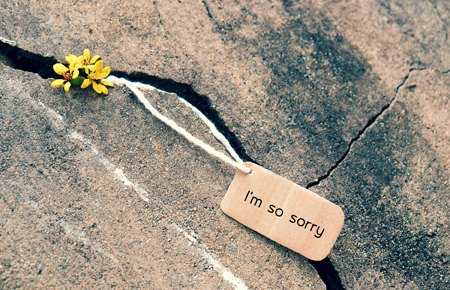A spouse acknowledges that his wife is a good mother and has sacrificed so much for their family and he apologizes for taking her caregiving and unpaid work in the household for granted all of these years.
A spouse acknowledges that their partner continued to work in a job that was not fulfilling in order to make sure their family had all the material resources and security they needed, and they apologize for never really appreciating this role.
A spouse apologizes to their husband for having an affair.
An apology can fundamentally change the direction and outcome of a family law matter. Correction … a good apology – one that is authentic, genuine, open, acknowledging, accountable, generous, kind, compassionate, self–reflective and grounded in a true desire to heal wounds and take responsibility – can truly shift an adversarial or strained separation between parties.
One big problem, outside of the personal challenges and limitations individuals have in truly apologizing or meeting the elements of a “real” apology, is that the institution of Law is generally not conducive to apologizing.
In family law, in particular in mediations and collaborative settings, an apology or the room to say sorry can be fostered and facilitated. In these settings, where litigation is off the table while people make an effort to negotiate, there can be space to speak from the place of hurt, pain and anger, and emotions in general are more likely to emerge. In litigation, there is no forum for an apology; there is no space for emotions or addressing underlying issues or wrongs. A “sorry” becomes an acknowledgement of wrong-doing, of liability and what damages and costs or claims will be lost by taking responsibility. The lack of humanity in the adversarial family law process (and in negotiation processes not structured to allow for a range of experiences) creates an impasse in allowing people going through the legal system to begin to heal from the breakdown of their relationships and families. Instead, surviving the legal system may become an additional trauma and challenge for separating spouses.
Not all litigation has to leave such scars or fuel adversity for separating couples. Building a court process that is not just civil but more humane can alter the shape of a relationship breakdown for parties. But there must be a willingness to re-imagine family law litigation that recognizes the long-term benefit of leaving parties more intact than in pieces when they leave a courtroom process.
Apologies can and do alter people. They confirm you are seen, heard, understood and believed. They hold an incredible source of power to move people forward, to release past resentments and damage, and they can allow people to learn and grow, leaving better humans, better spouses, better parents, better families and if we create the space – a better legal system.


